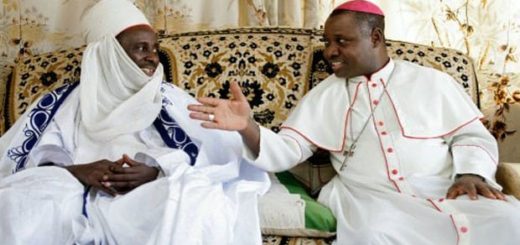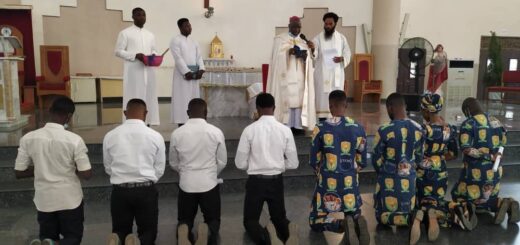God calls Christians to Holiness and Loving Service
by ARCH BISHOP · June 18, 2023
11th Sunday in Ordinary Time, 18th June, 2023, St. Mary’s Parish, Karu, Homily by Archbishop I. A. Kaigama.
Readings: Ex. 19: 2-6; Rom. 5:6-11; Mt. 9:36-10:8
God calls Christians to Holiness and Loving Service
This Sunday, the readings remind us of God’s tender love and compassion: “I bore you up on eagle’s wings and brought you to myself” (Ex. 19:4). God chose us and gave us an identity as a people reconciled in Christ; each of us is called by name, consecrated to form a holy people. As disciples of Jesus, we are called and sent to continue His mission of healing, giving hope to those who are without hope; to show compassion to those who are dejected, side-lined and abandoned by the society.
We read in the first reading how God liberated the Israelites from slavery in Egypt to be His own possession, a kingdom of priests and indeed a holy nation (cf. Ex. 19:3-6). It was God who chose Abram (cf. Gn. 12:1-3); Jacob not Esau (cf. Gn. 25:22-23); Moses to lead the Israelites out of Egypt (cf. Ex. 3:2-10); He chose David and Solomon to be kings, He chose Elijah, Isaiah, Jeremiah, etc, to be prophets and He chose Israel to be His people. From among Israel, He chose the twelve Apostles to be the first agents of proclaiming the Kingdom. He said to them: “Go and proclaim the message: The kingdom of heaven is near. Heal the sick, bring the dead back to life, cleanse the lepers, and drive out demons” (Mt. 10:7-8). He has chosen us the baptized too that we might become conduits of grace and hope in the world. We, seated here, are God’s elect, chosen for mission.
In the second reading, St. Paul reminds the Romans that despite their unworthiness they were still the recipients of God’s gift in Christ. He used several expressions of unworthiness, “helpless”, “sinners”, “ungodly”, “enemies”, etc., to prove how God gives strength to the weak, courage to the fearful, refining sinners into righteous people and fills them with “joyful trust in God” (Rom. 5:11).
Our gospel reading shows the compassion of Jesus over the people He encountered in His ministry. On seeing the crowds, “he felt sorry for them” (Mt. 9:36). By this statement, Matthew seeks to capture the depth of the feeling of Jesus over the suffering of the poor and oppressed people whose lives He wanted to transform. Seeing how they were “harassed and dejected, like sheep without a shepherd” (v. 36), He responded promptly to their plight. He knew that the political leaders and the religious authorities of His time had no real concern for the marginalized and those who suffer. Their focus was on maintaining their privileged leadership positions, while neglecting the hungry, the sick, and the oppressed of the land. Jesus, in contrast, identifies with His people’s sufferings. To help Him serve the people, He selected twelve Apostles who came from different backgrounds and temperaments. Matthew left the tax collector’s desk, Simon Peter abandoned fishing and Simon the Zealot left his old ways of violent political agitation to preach a message about a kingdom built by love, not hatred or violence. Jesus conferred authority on them, an authority, not over people alone, but over evil, and He instructed them: “You received without charge, give without charge” (Mt. 10:8).
It is not impossible for our leaders to cater for the poor and the needy in Nigeria. We however need leaders who identify with the people’s sufferings. Despite our diversities, we can still team up not only as friends but also as brothers and sisters of one heritage. We are so religious outwardly, and like the Israelites, we are quick to say, “All that the Lord has spoken we will do!” (Ex. 19:8) but both in private and in public, we are ungodly in behaviour, insensitive about one another’s needs and feelings. Despite the monumental and pervasive corruption, the reckless use of resources or fraudulent strategies to win elections, God still does not abandon us or let us to be destroyed. He reaches out to us even when others think we are on the brink of collapse. No wonder, some people say that God must be a Nigerian!
I commend the good work being done in your parish by priests of the Missionary Society of St. Paul (MSP). I appreciate officials of the parish council, leaders of the various church societies, the catechists and the volunteers who helped in the preparation of these candidates for confirmation, the sacrament that confers on the recipients the grace and strength to be faithful witnesses of the gospel of Christ in our society badly in need of the good news.
How our country could be very great if only we avoid “better than thou attitude,” or the spirit of exclusivism and we obey God’s commandments and work towards harmonious social relationships. Nigeria has been too long in the news for the wrong reasons: for terrorism, kidnapping, cybercrime, drug trafficking, banditry, fraud, corruption, etc. Our new leaders must not just seek to become famous or revered, and especially not to enrich themselves, so that we can witness a new dawn. A lot of resources are wasted in Nigeria. Smaller countries in Europe with far less resources send us financial aid which unfortunately is not even well utilized. Officials who plunder mindlessly the people’s resources go scot-free because the whole system is shrouded in contemptuous corruption.
I call on us all, including you the Parish Priest, Fr. Alexander Imoh Titus, MSP, your assistant, Fr. Livinus Ezike, MSP, the priests in residence, Fr. Maurice Udoh, MSP, and Fr. Emmanuel Olofu, MSP, and you the entire parishioners of St. Mary’s Parish, Karu, to be a light that shines ceaselessly, praying that the unpatriotic activities and huge wastage of resources in the name of governance will be a thing of the past. So, help us God.




